Policy Content
Policy
Various policies are developed to ensure that all users can use Kakao services safely.
Kakao Privacy Protection Policy
1. Kakao Privacy Policy Labeling
Kakao believes that the first step of guaranteeing the right to self-determination of personal information is to provide easy-to-understand information about what kinds of personal information are collected by Kakao, and the procedure and method of processing them.
Kakao disclose its personal data processing policy transparently so that users can check information related to Kakao’s personal data processing at any time. In particular, we understand that the personal data processing policy prepared in accordance with applicable laws can still be complicated and difficult to understand for users, and try very hard to provide a processing policy that anyone can easily understand.
The Kakao Privacy Policy uses easy words and sentences so that users can easily understand them, and applies self-developed labeling images so that users can intuitively accept them.
Check our labeling design philosophy and storyNew Window
2. Personal Data Processing Procedure
Kakao collects, uses, and provides personal information based on user consent and actively protects users' informational autonomy. For secured service use, Kakao is committed to protecting privacy.













3. Privacy by Design
Kakao applies ‘Privacy by Design’ as a basic principle.
We embrace Privacy by Design (PbD) as the overarching principle for data privacy, and protect users’ personal data based on this principle.
Privacy by Design means ‘design considering privacy issues at every stage’. Rather than responding to privacy violation after it occurs, we predict and anticipate privacy violation risks or prepare against such risks from the planning and design stages, to eliminate risk factors in advance. Operating a PbD-based privacy protection policy is suitable for a business environment with fast technological development because it can comprehensively review not only legal violations but also possible infringements on user privacy.
Based on the following seven Privacy by Design principles, Kakao ensures that personal data protection principles are internalized into its services by reviewing the application of laws, policies, and technologies that consider personal data protection through privacy impact assessments across all stages of service planning, operation, and termination.
Personal Information Processing Policy for Children and Youth
1. Easy-to-Understand Personal Data Processing Policy
Kakao provides “Easy-to-Understand Personal Data Processing Policy” to help users who are 14 years or younger check and understand Kakao’s Privacy Policy. A children’s advisory group consisting of children under the age of 14 participated in the production of this easy-to-understand policy. It is in the form of KakaoTalk chats between Ryan and Choonsik, so even children who are not familiar with long text can easily read it.
Privacy policies are important documents that inform users about how their personal information is handled. However, they can often feel too complex for children due to complicated terms and lengthy explanations. To make its privacy policy more accessible for children and teens who use Kakao’s services, we looked for ways to help them understand the process more easily. Kakao concluded that the best approach was to involve children directly in creating a version they could truly understand.
To that end, Kakao formed a “Children’s Advisory Panel” made up of children under the age of 14. They actively contributed by reading through the privacy policy and suggesting simpler alternatives to difficult terms. The panel’s involvement also gave Kakao insight into what children are curious about, such as the types of personal information collected and why parental consent is required, through the questions they asked during the process.
> Learn more about the background and activities of the Children’s Advisory Panel새창열림
Since its initial release, the Easy-to-Understand Privacy Policy has been updated to reflect changes in regulatory standards and to include clearer, more essential information.
2. Privacy Protection Guide for Youth
The Privacy Protection Guidelines for Teenagers, which explains how children and teenagers can safely use Kakao's services through various privacy protection features provided by Kakao, was created with the help of a youth advisory group consisting of middle and high school students.
In this Guidelines, teen-friendly language was used instead of difficult terms to make teenagers feel more comfortable, and real Kakao Service screens and virtual KakaoTalk chats were used to help them use security features without any difficulty.
Kakao provides the Privacy Protection Guidelines to help children and teenagers using Kakao’s services protect their own privacy in everyday life.
Personal information refers to all information that can identify you, including your name, phone number, home address, school, photos, ID and password for websites you have signed up for, etc. You should manage your personal information carefully because they can include many information related to the privacy (name, school, etc) of yourself, family and friends. In particular, personal information should be managed even more carefully for users aged 14 and over because they can decide whether or not allow the use of their own personal information.
You should keep your personal information safe and not disclose it to other people because they can be used for fraud, crimes, etc. once leaked.
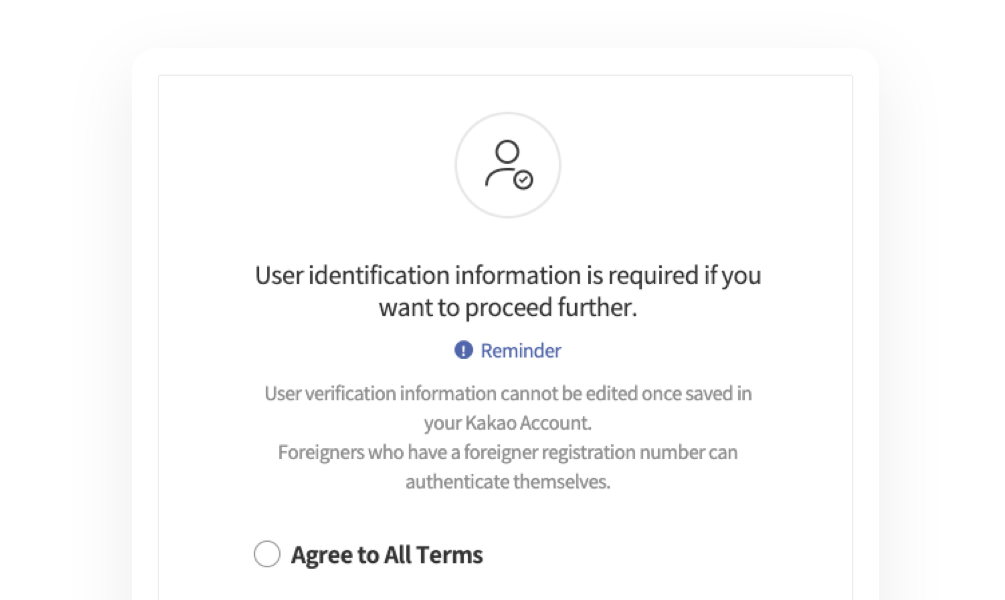
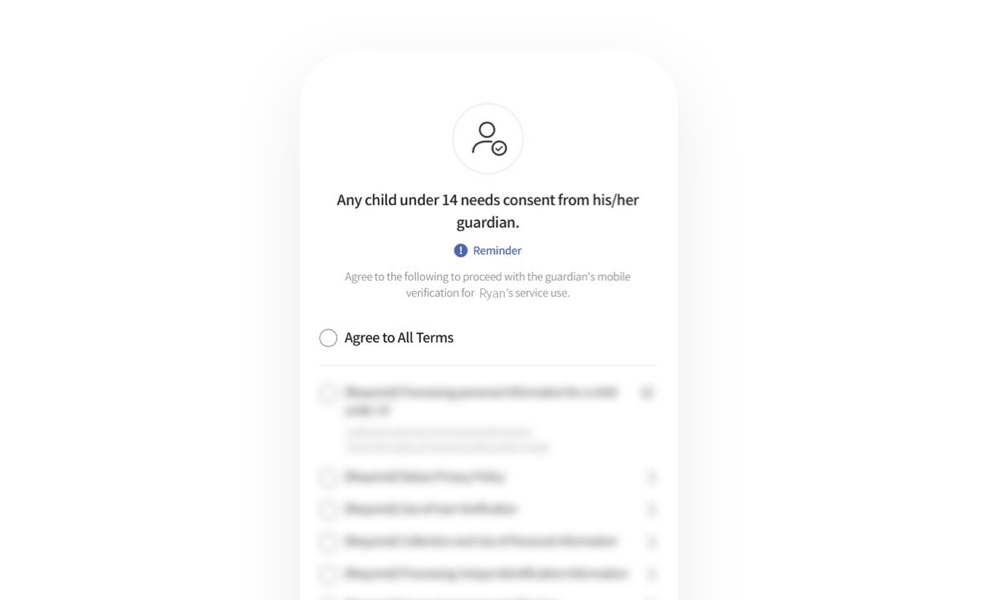
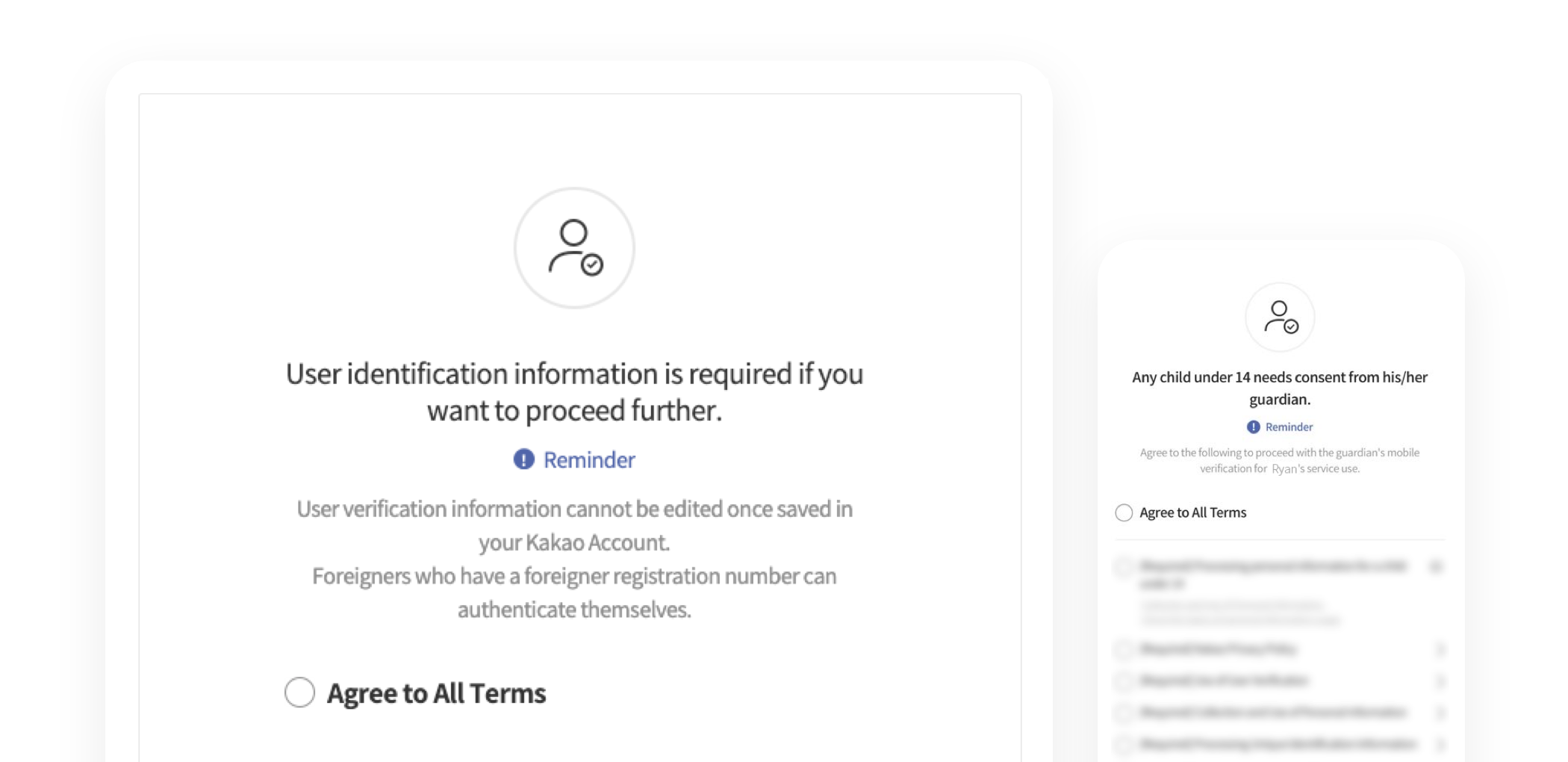
Children under the age of 14 are deemed unable to fully understand the risks and consequences of personal information processing, and the rights of a user. Thus, a consent of a legal representative (guardian) is required by law when their personal information is collected. A legal representative is a person who can protect a child or a teenager. A parent or a guardian designated by law (a relative, an attorney, etc) can be a legal representative.
Kakao Services requires the consent of a legal representative when collecting, using and providing the personal information of children or teenagers under the age of 14 for their service use.
Roles of a legal representative (guardian)A legal representative (guardian) is advised to carefully examine the types of personal information to be collected and used before giving consent so that the personal information of a child can be protected.
Kakao provides a family account service connecting a guardian to a child to protect the child's privacy. The main user managing a family account must be 19 years old or over, and may create a family account after completing user identification using Kakao Certificate.
Check family accountNew Window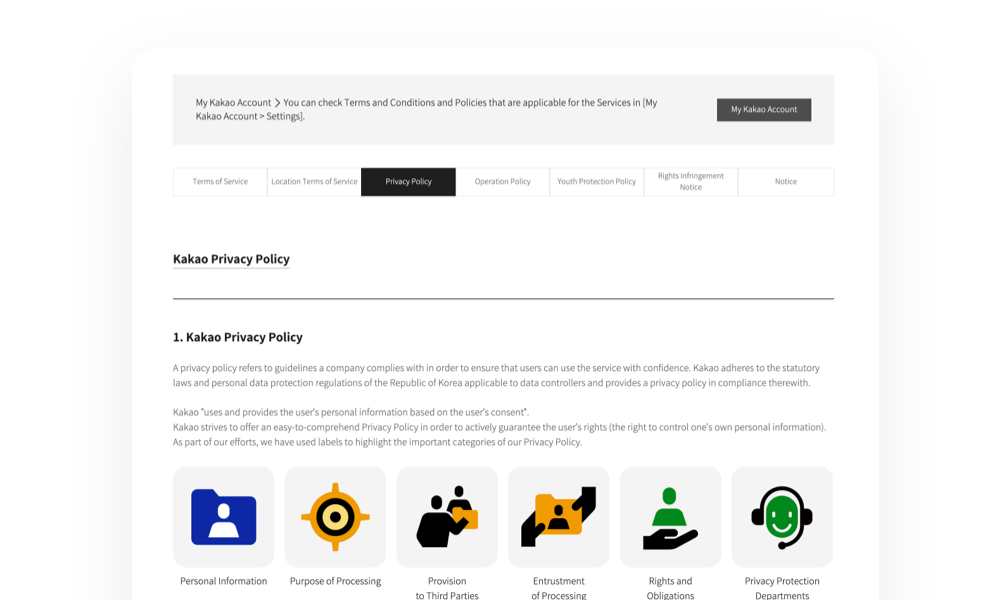
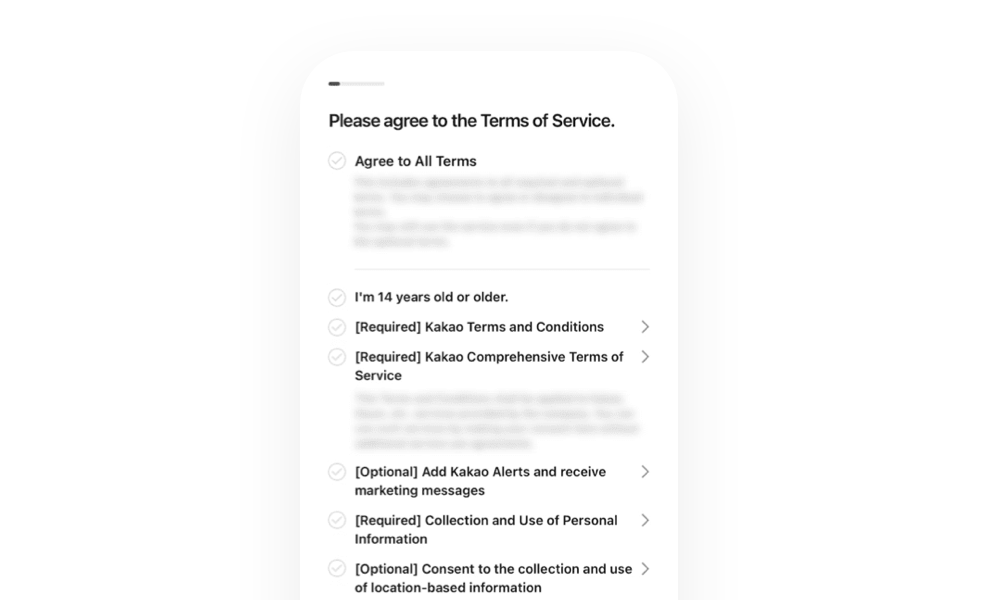
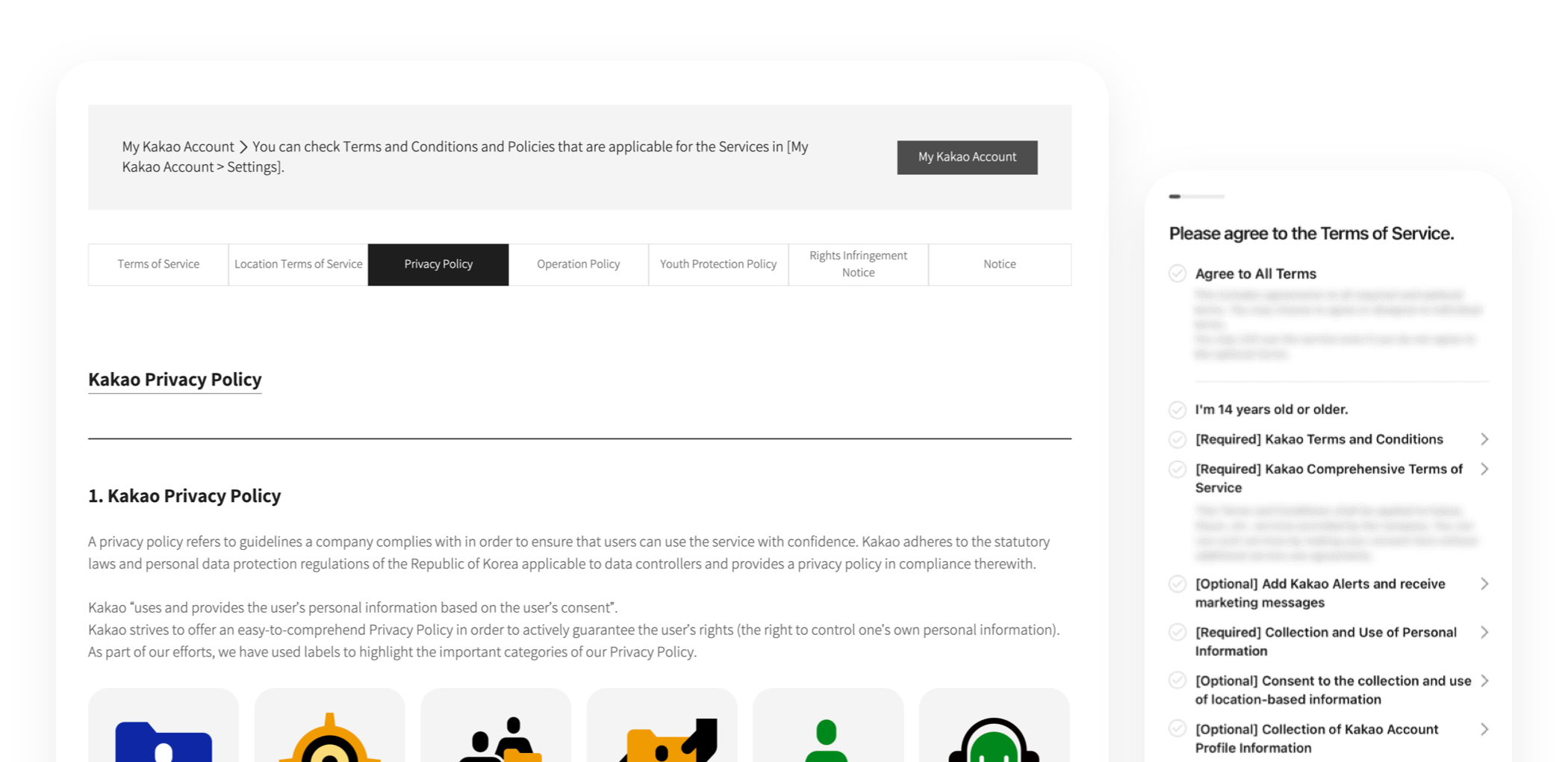
The Privacy Policy explains how the Service processes personal information, such as collection, use and provision. Please read carefully the agreement and the Privacy Policy when signing up for a service or providing your information. You may choose to agree or not agree to optional items for additional services.
Please read the details carefully and decide whether you need the service or not.
Check the Privacy PolicyNew WindowCheck my agreement detailsNew Window
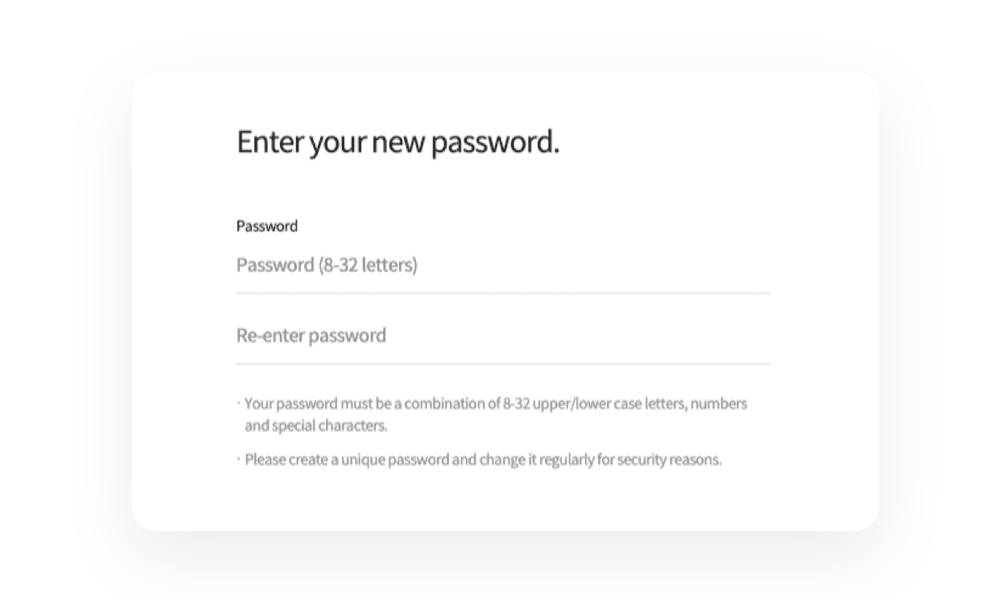
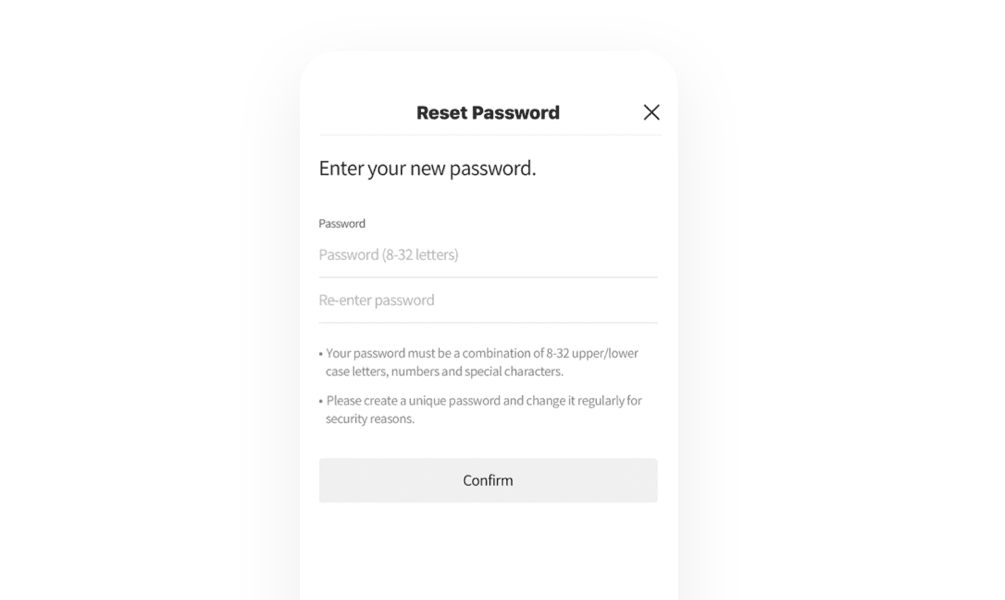
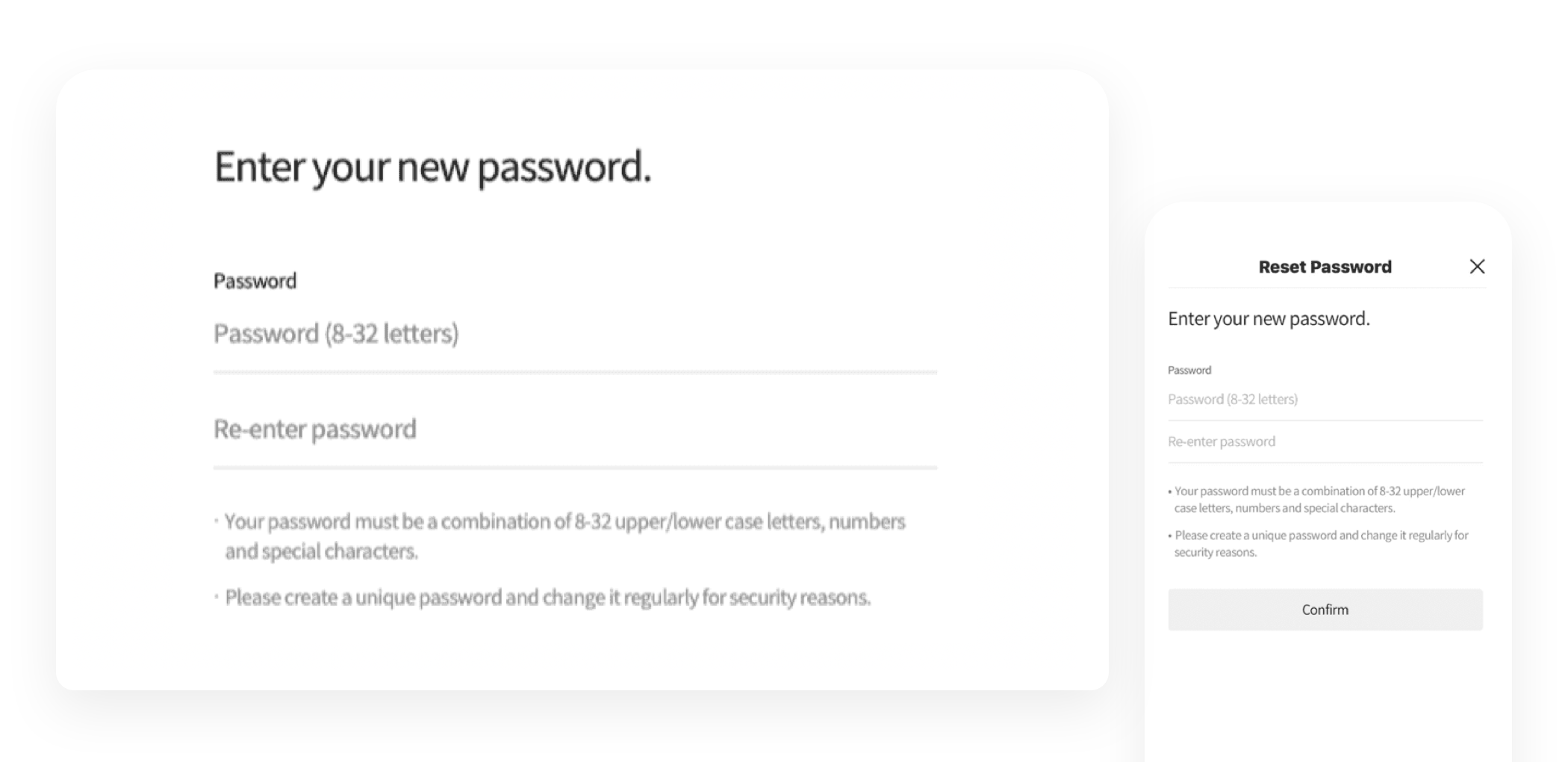
Protect your password by creating a password that is difficult to guess or crack. Here are some tips for creating a safe password. You can change your password for Kakao Account as follows.
- KakaoTalk : Settings > Kakao Account > Change Password
- Web : Manage PasswordNew Window
- 1. Do not repeat the same letters or numbers, and use a combination of letters, numbers and special characters.
- 2. Do not use your ID, birthday, phone number, etc. in your password.
- 3. Set different passwords for each service.
- 4. Please change your password on a regular basis.
- 5. Use biometrics (fingerprint, etc) or patterns along with a password to secure your account.
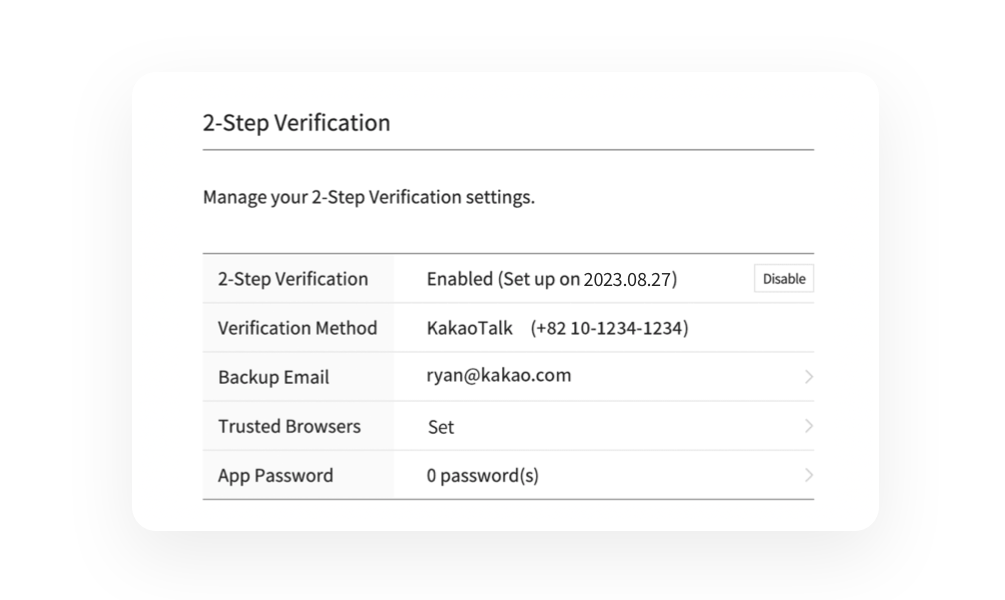
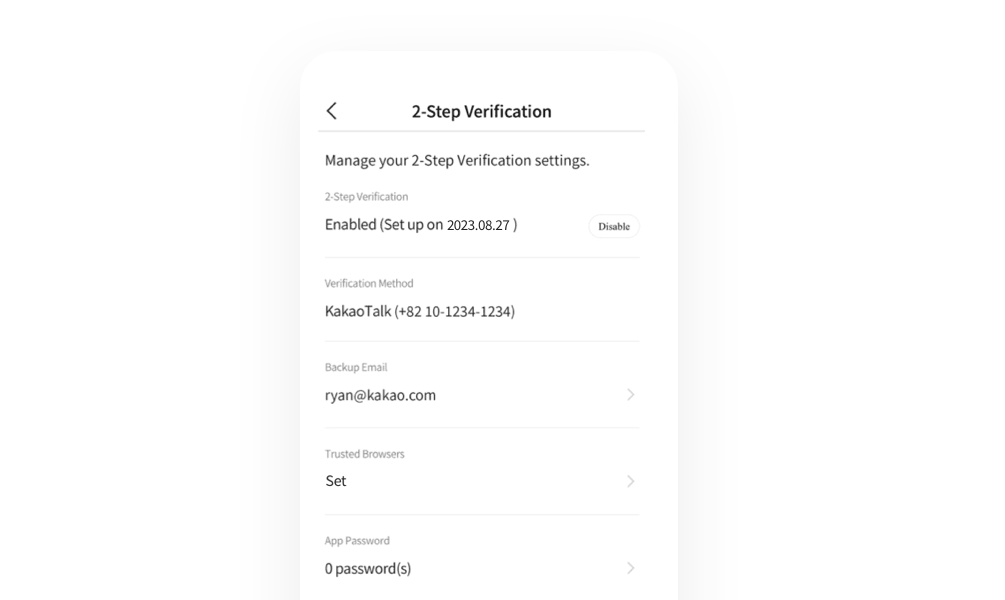
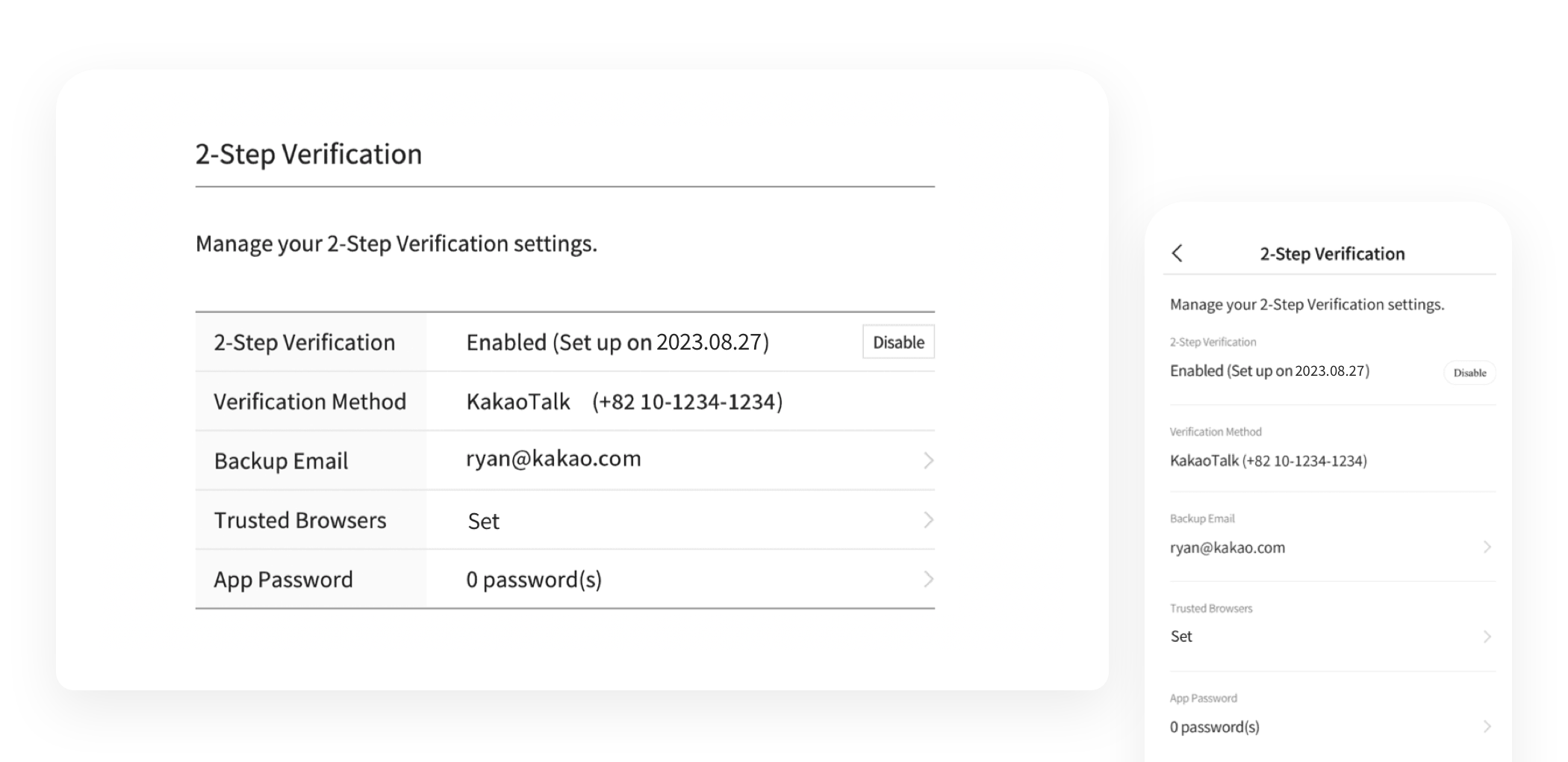
2-step verification is a feature that adds an extra layer of security, requiring users to completing a pre-set second verification step when logging in. Once the 2-step verification is set, another person cannot log into your account even if the person knows your account and password.
The 2-step verification can be set through KakaoTalk or phone number verification, and you can also set an email for emergency contact purposes just in case that you cannot access your mobile phone. You can set 2-step verification as follows.
- KakaoTalk : Settings > Kakao Account > 2-Step Verification
- Web : Set 2-step verificationNew Window
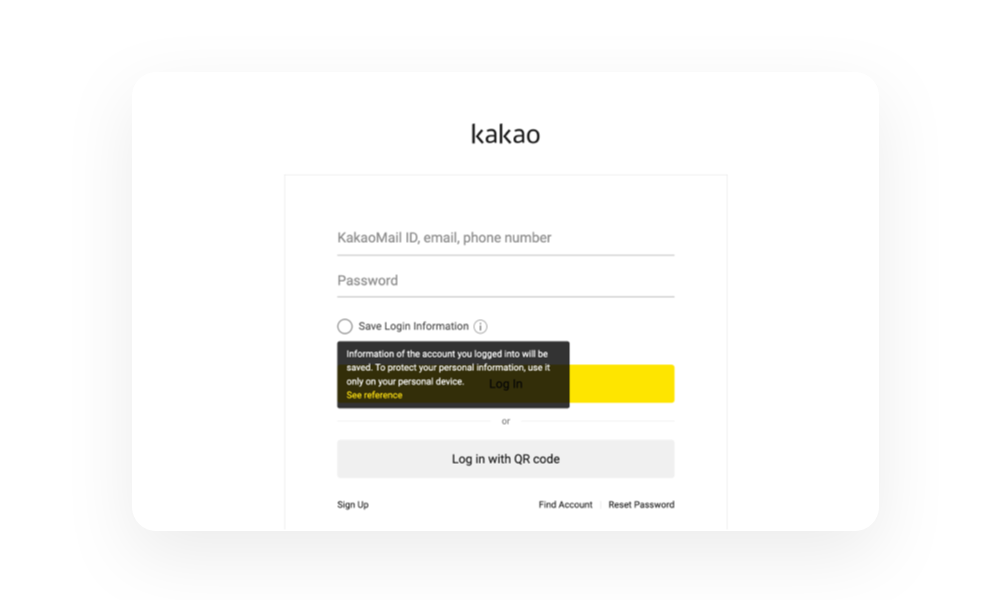
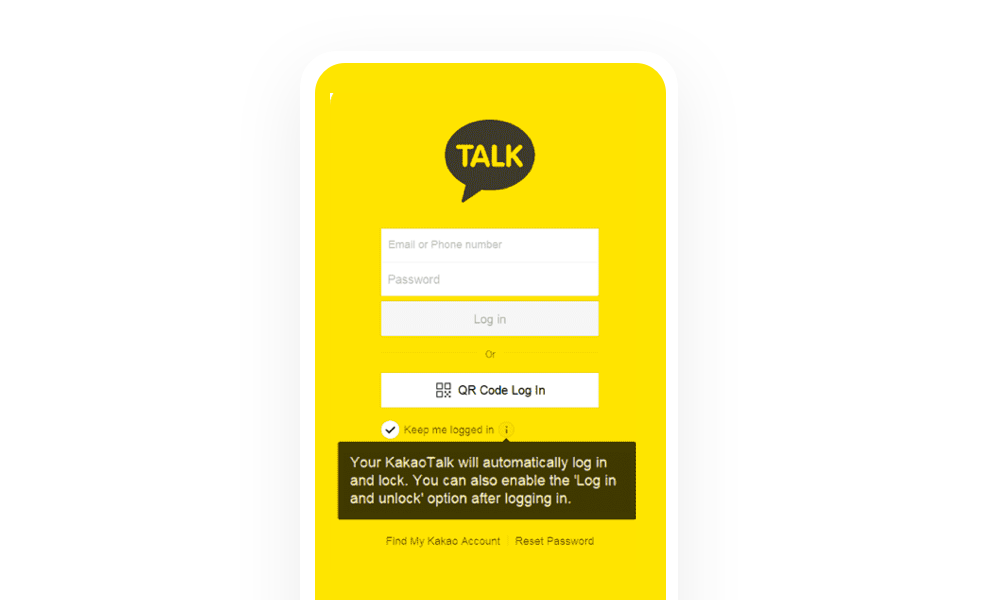
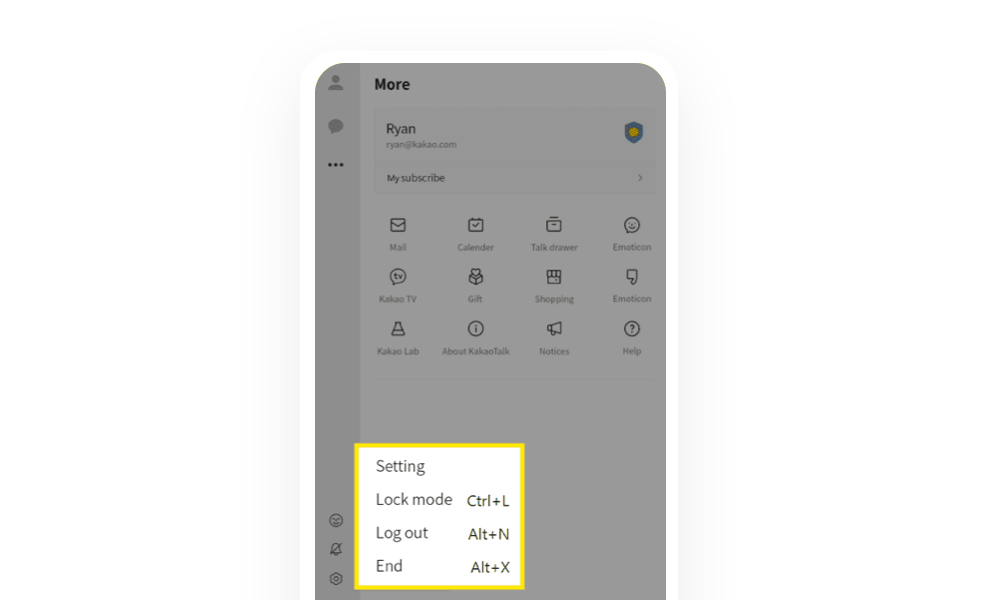
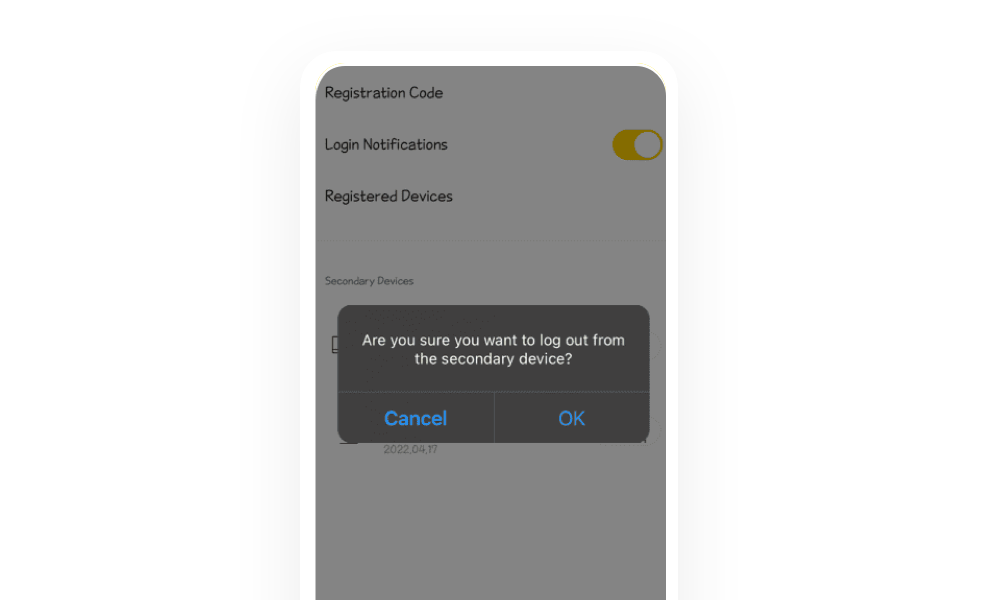
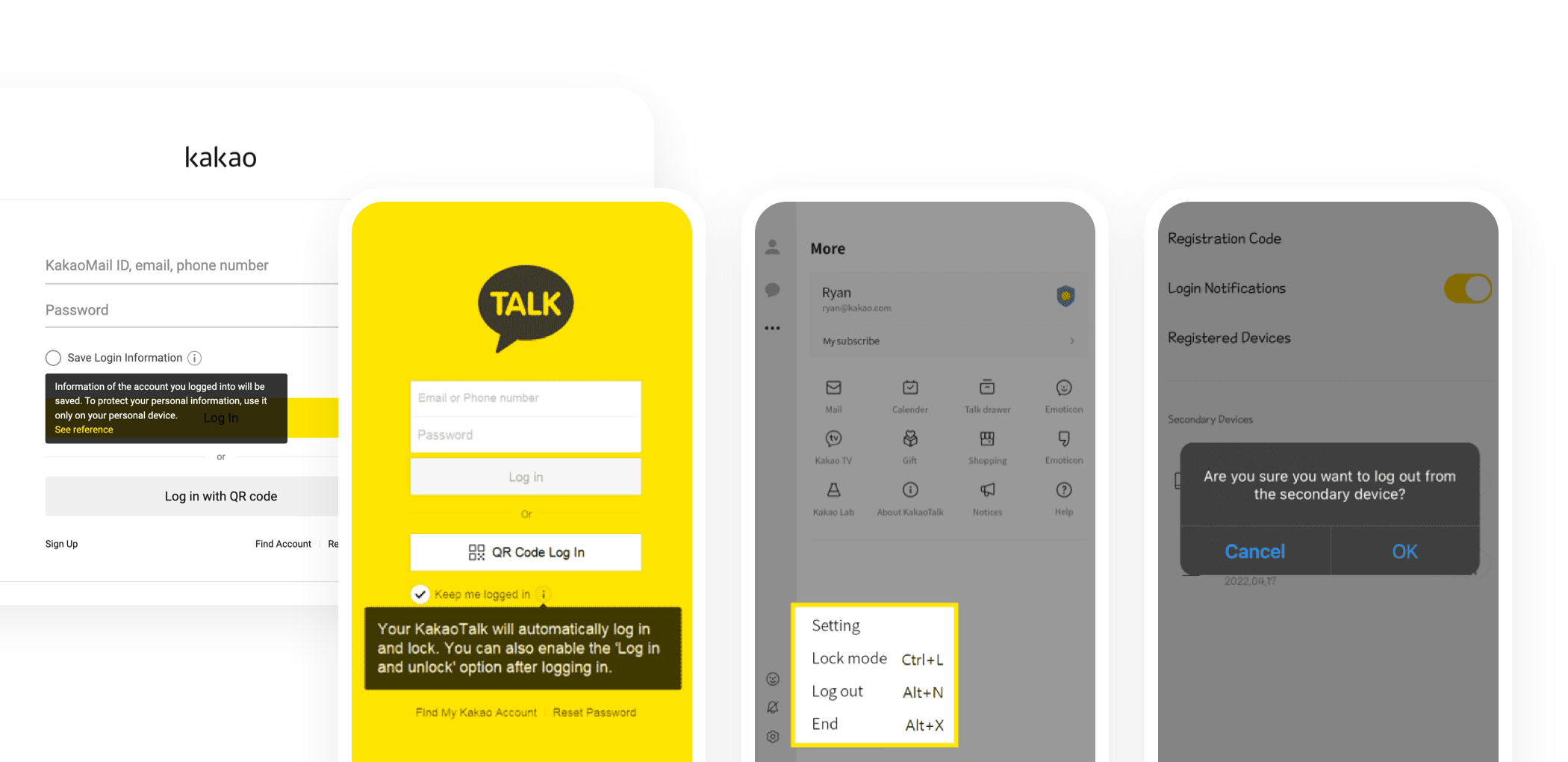
When you log into your Kakao Account or KakaoTalk using a public device (devices used by many people such as computers in schools or Internet cafes), do not check 'Keep me signed in' or 'Auto-Login'. If you select 'Keep me signed in' or 'Auto-Login', you stay signed in until you log out or delete cookies in the browser. In this case, your personal information is more likely to be leaked if you are not using a personal device. Cookies are small text files tracking information about all the sites you visit. They are called 'cookies' because the trails of data are like cookie crumbs that you have left across the internet.
Make sure to log out when you are done using a public device. After you log out remotely, please double-check that the device has been removed from 'Registered Devices'.
If you forget to log out of KakaoTalk from a public device, you can log out using the following methods.
- KakaoTalk : Settings > Privacy > Manage Devices > Remove the device you want to log out from.
- Web : Remote loginNew Window
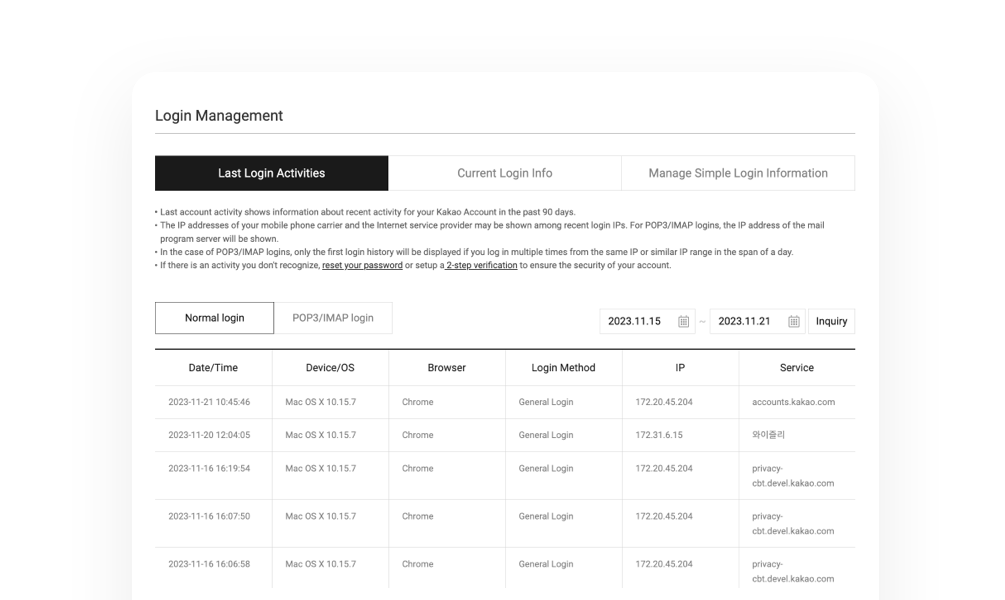
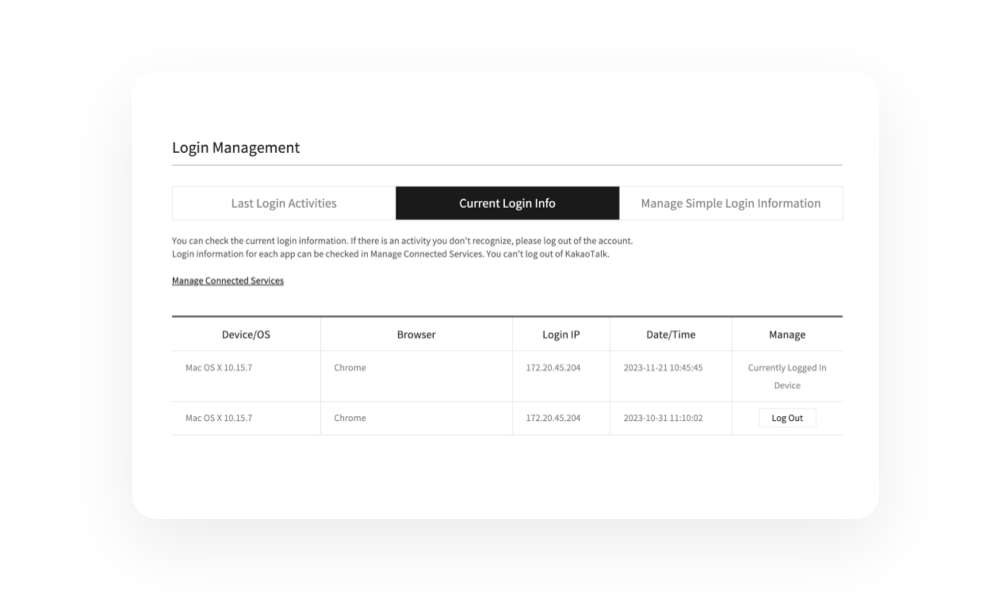
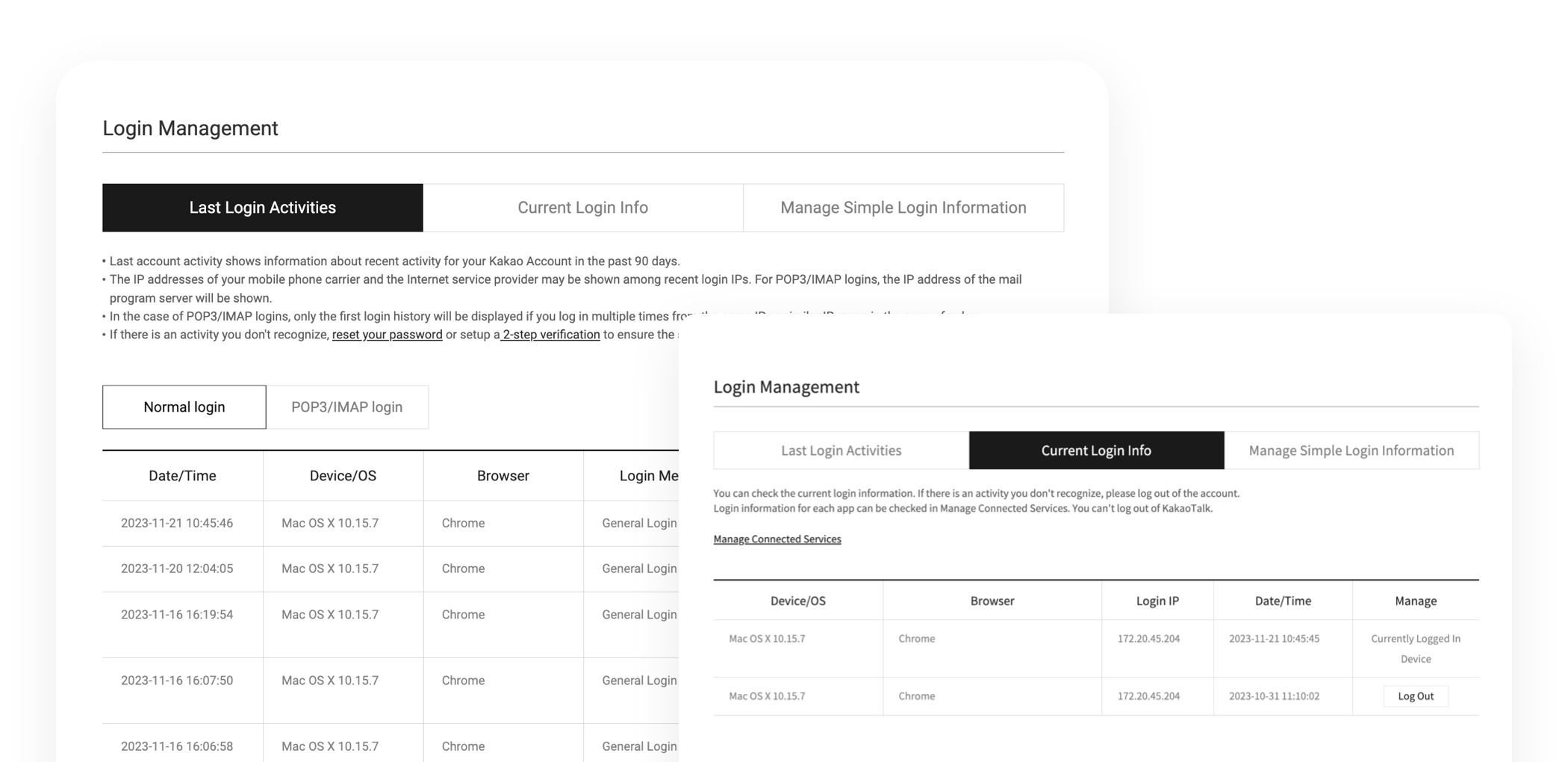
You may check your Kakao Account login history for the past 90 days and the information of devices currently logged into your Kakao Account from the Kakao Account management site. If you find any login or device record which has not been created by you, you must reset your password. Also You can check your login history and device information as shown below.
- KakaoTalk : Settings > Kakao Account > Login Management
- Web : Manage LoginNew Window

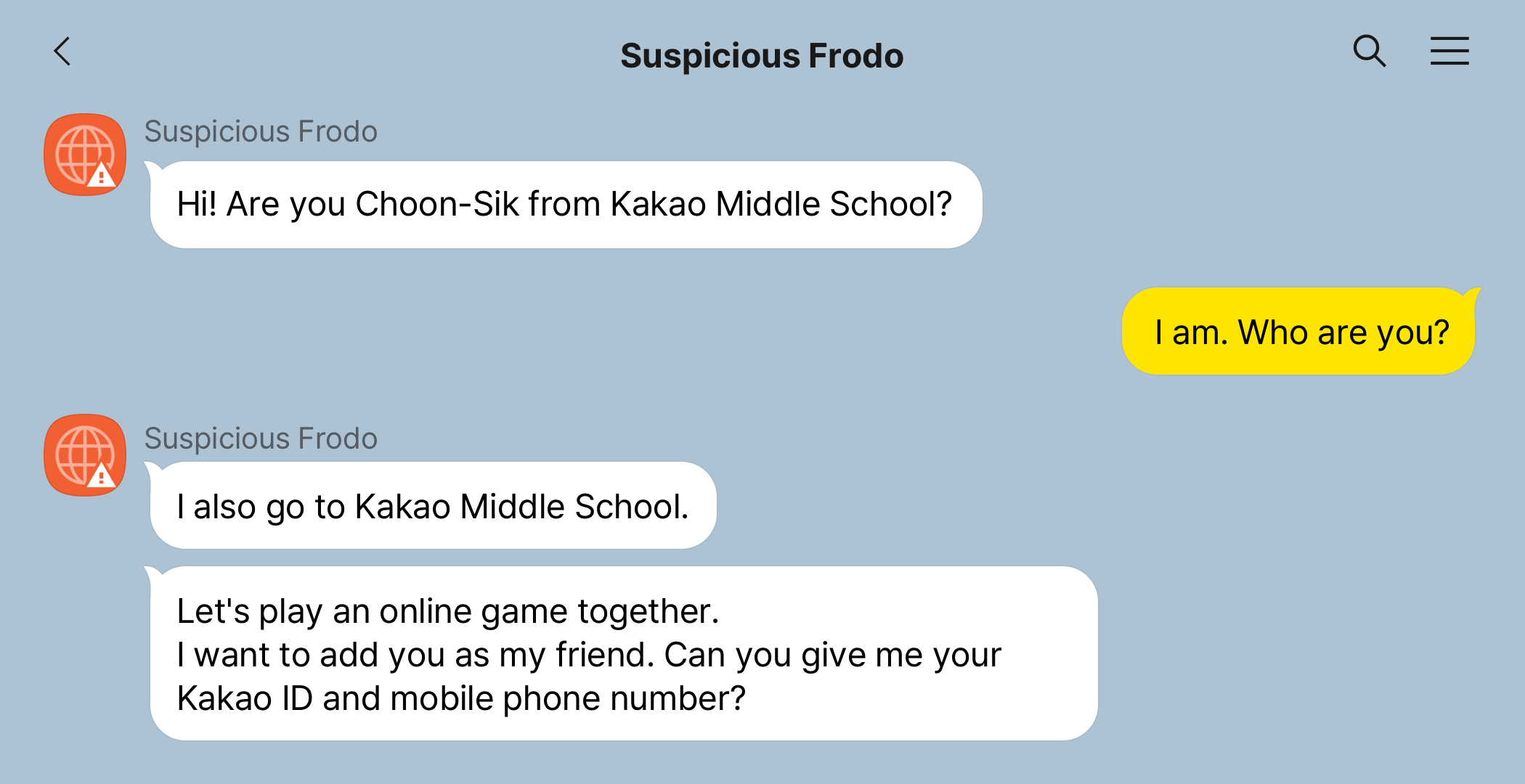
You should never share or send your personal information to a person you don't know because personal information disclosed to a wrong person can be used for illegal activities such as fraud and other crimes.
Even when your friend asks for your personal information, you must check if that person is really your friend. Sometimes a person can hack into your friend's account and pretend to be your friend in order to steal your personal information. When a non-friend tries to have a chat with you on KakaoTalk, an orange-colored profile image and a warning message will be shown.
When you send photos and files via KakaoTalk, send them to a person who really need them in a private chatroom. Be careful when using a group chatroom because your information can be shared to other people who do not need to know it.
You may restrict access to your KakaoTalk information by blocking the KakaoTalk ID search, using the multi-profile feature, or choosing "Hide My Profile" against blocked friends.
![Conversation with Suspicious Frodo, Suspicious Frodo: Congratulations, Ryan! You won a gift voucher!, Me: Wow!!!!!! Really???, Suspicious Frodo: Yes, click the link below and we'll send you a gift voucher, [OO Coupon] Information for gift voucher winners http://go*.gl/xxx*xx](/privacy-2023/service/image/rw3x/policy/img_unknown_eng.png)
![Conversation with Suspicious Frodo, Suspicious Frodo: Congratulations, Ryan! You won a gift voucher!, Me: Wow!!!!!! Really???, Suspicious Frodo: Yes, click the link below and we'll send you a gift voucher, [OO Coupon] Information for gift voucher winners http://go*.gl/xxx*xx](/privacy-2023/service/image/rw3x/policy/img_unknown_pc_eng.png)
You should not click URLs included in suspicious KakaoTalk messages, emails and texts and just delete them because they could be phishing attempts or malicious codes. Phishing is a technology used to steal the information of a user or a company through an email or a messenger.
When you enter personal or financial information from an online screen, always check the URL of a homepage or the sender of an email to see if it is a phishing attempt.
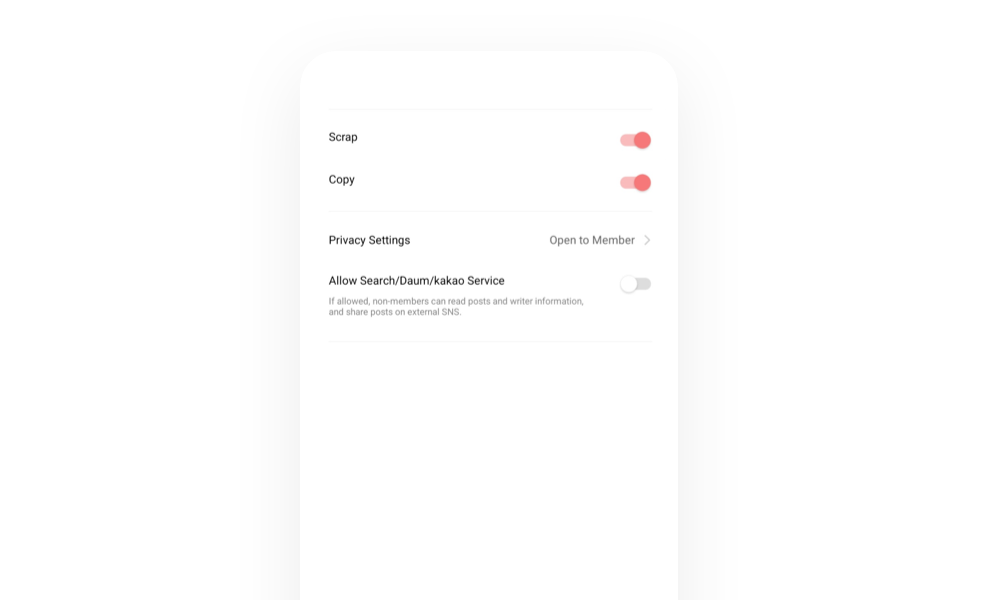
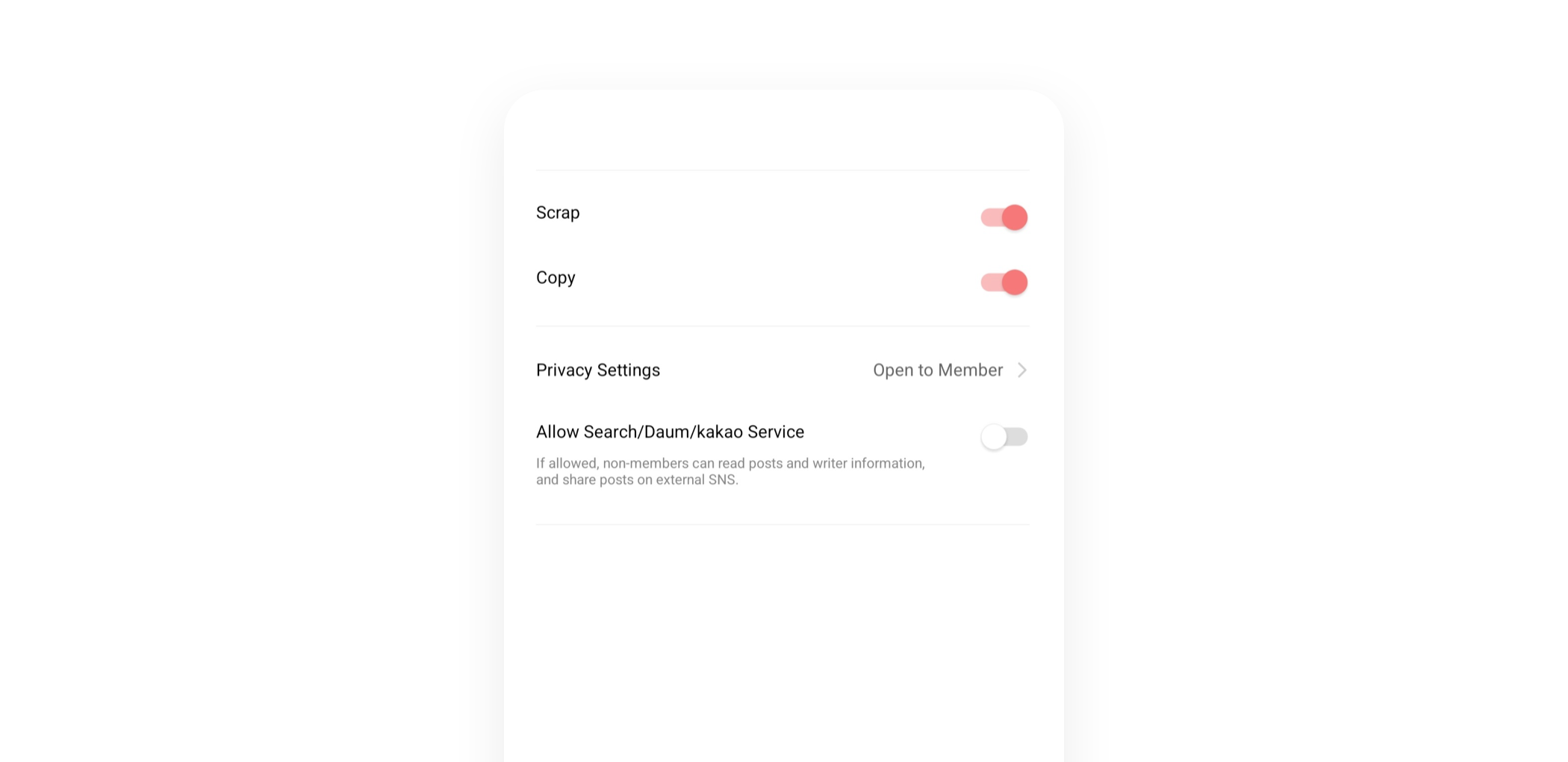
Always check the privacy settings of your posts because photos and articles posted on the Internet can be copied without your permission and used by someone else for undesirable purposes. Make sure that the personal information of yourself, family and friends is not included in your posts.
You should avoid setting the privacy setting to public unless it is absolutely necessary because posts and photos with "Public" settings can be captured or copied by anyone.
In Kakao Services, you can set and manage the privacy settings for posts, photos, etc. for each service.
In the case of the breach of privacy, your personal information can be used in crimes. Thus, privacy violation must be prevented in advance. Breach of privacy: Collection, use and provision of personal information without permission, leakage of personal information, misuse, illegal distribution, etc.
If you discover that your information is disclosed in posts, files, etc. which are available online, or that someone you don't know has your personal photos and videos, please ask your guardian for help.
You should never leak or illegally distribute someone else's information because you may be held legally responsible. If any breach of privacy occurs while using Kakao Services, you should report it immediately to prevent additional damages.
- KakaoTalk : Settings > Support > Contact Us
- Web : Reporting the breach of privacyNew Window
Kakao is taking actions against the breach of privacy which can occur online though 'A Safe Digital World made by Kakao'New Window

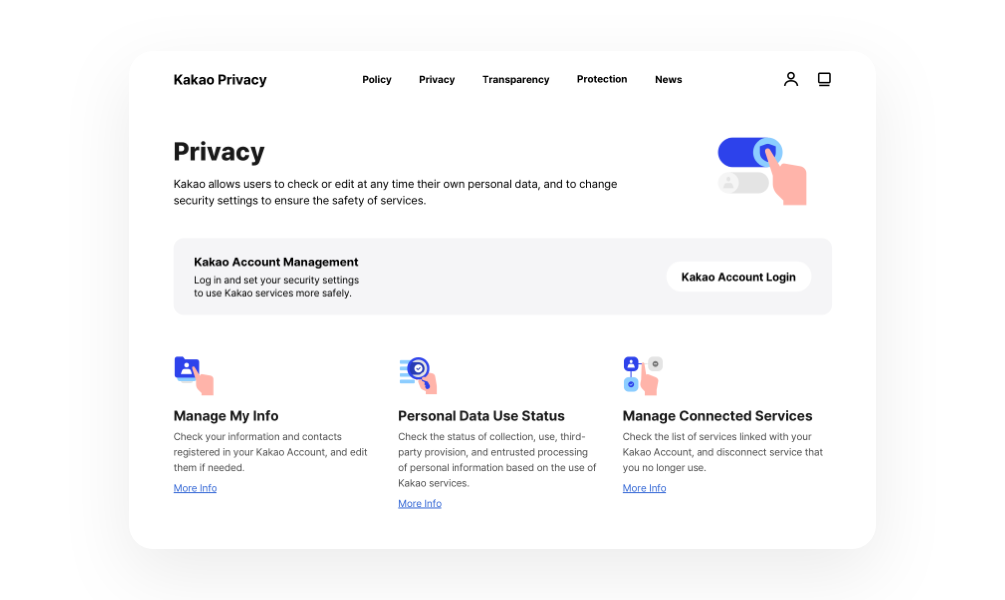
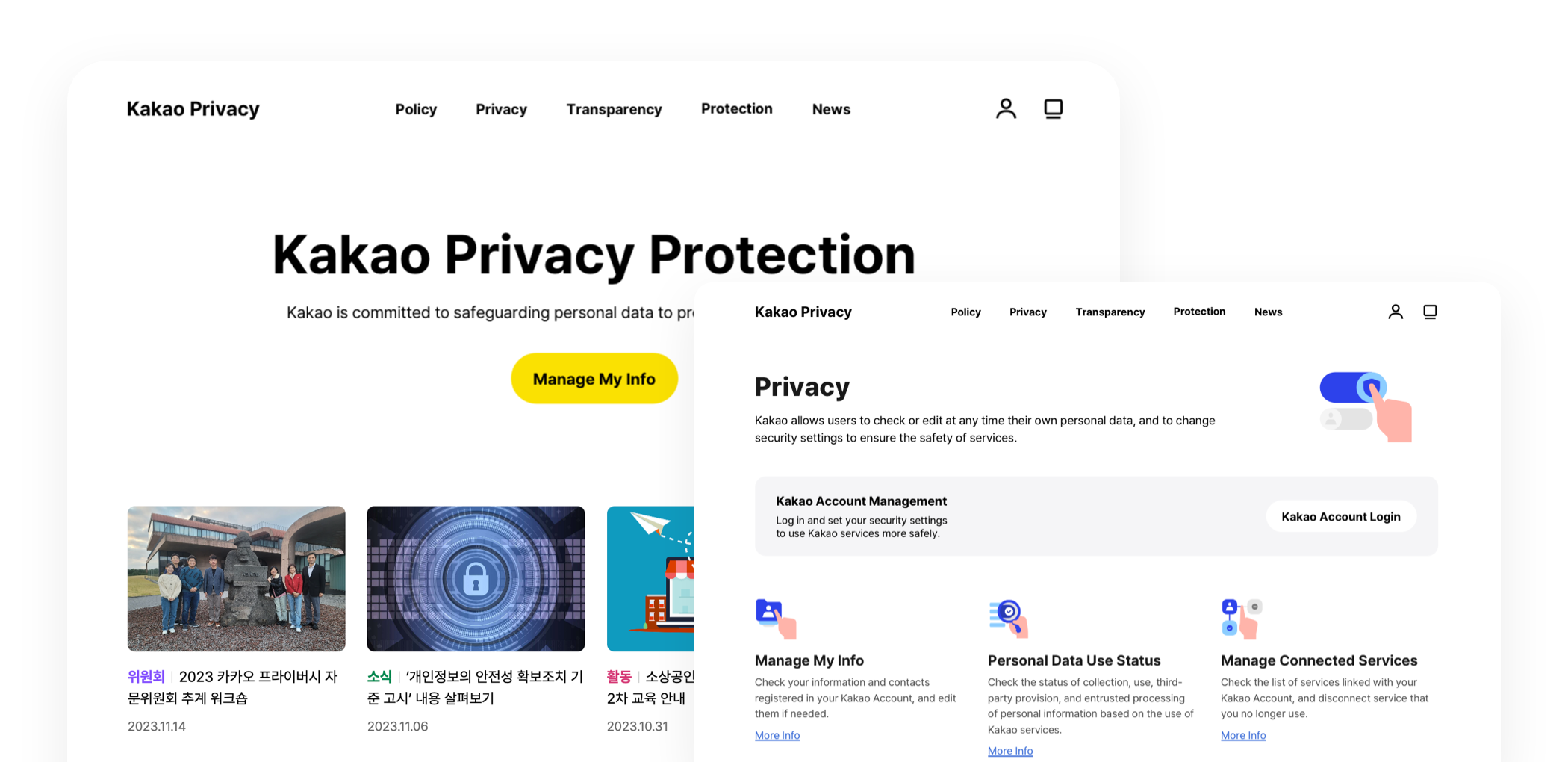
Kakao account members can check and manage my information directly on the Kakao privacy site or on the account management menu.
Managing my informationNew WindowTo develop privacy protection guidelines, a youth advisory group consisting of middle and high school students participated directly in the production process and shared valuable opinions from the perspective of youth. Kakao reflected the opinions of the Youth Advisory Group and published the ‘Privacy Protection Guidelines’, which allows children and teenagers to safely use Kakao’s services through various privacy protection features provided by Kakao, based on situations related to personal information that children and teenagers face in real life.
Kakao Friends characters were used to make teenagers feel more comfortable, and teen-friendly language was used instead of difficult terms. In addition, real Kakao Service screens and virtual KakaoTalk chats were used to help them use security features without any difficulty.
3. Consent to Collection and Use of Personal Information for Child Accounts
To help children under the age of 14, Kakao provides an easy-to-read consent form for collecting personal information when creating a Kakao account. Kakao is fully committed to protecting children’s personal information.
When signing up for Kakao services, we only collect the personal information that is absolutely necessary. For children under 14 to create a Kakao account, we are required to obtain the consent of a legal guardian (such as a parent or someone legally authorized to act on their behalf) regarding the collection of personal information. This means that guardian information is also needed. Please review the following information carefully, and ensure that both the child and the guardian give their consent together.
Certain personal information is necessary to create a Kakao account and use our services. Let us explain, step by step, what information we collect and why.
- 1. To tell you apart from your friends and link your profile information, we collect your email address, password, nickname, and profile picture.
- 2. We collect your friends list so you can add and recommend friends, and send notifications to them.
- 3. We need your contact information(either an email address or phone number) to verify your identity if you forget your ID or password, to share important updates about Kakao services, or to respond to your questions.
- 4. We also collect personal information to help you use our services, provide updated features, develop new services, offer content and services relevant to you, and prevent behavior that could harm others. The information we collect includes email, password, nickname, profile picture, friends list, contact information, service usage history, and purchase/payment history within the services. However, until you turn 14, we do not use your information to recommend personalized content.
However, if you haven’t used the services for over a year, submitted a question, or caused harm to others while using the services, the deletion timeline may vary.
Also, while you’re using Kakao services, some information like the device details of your computer or mobile phone, IP address, access date and time, and service usage history may be collected automatically. We also use cookies to provide a better service experience. If you don’t agree to the collection and use of personal information, you won’t be able to create a Kakao account. Once your guardian agrees to the above, you’ll be able to use various Kakao services with your account.
To learn more, please check [Easy-to-Understand Privacy Policy], [Kakao Privacy Policy] .
When creating a Kakao account, you can choose to provide additional profile information such as your date of birth and gender. If you agree to share this information, you can access features like friend recommendations and birthday notifications. (This information is also used to offer services and information, including ads that are more relevant to you.)
Your agreement to the collection of such profile information will be used for the purpose of recommending friends, or providing services and information (ads) related to you. Collected information will be deleted immediately if you withdraw your agreement or close your Kakao Account. However, we will not use your information to recommend customized content, etc. until you are 14 years old.
Any information collected will be immediately deleted if you delete your account or withdraw your consent.삭제 아이콘
Providing additional profile information is optional, so you can still sign up for a Kakao account even if you choose not to consent to it. Providing additional profile information is optional, so you can still sign up for a Kakao account even if you choose not to consent to it.
Privacy Protection Guide for Senior Citizens
Kakao provides the Privacy Protection Guide for Senior Citizens for seniors who have difficulty managing personal information in a digital environment. To develop this guide, we consulted Professor Mun-Jeong Choi and doctoral students of the Aging and Technology Policy Lab at KAIST for contents and delivery methods, and created a video which can help senior citizens living in a digital environment. This guide consists of three videos explaining the concept and importance of personal information, how to prevent personal information infringement such as phishing, and how seniors can manage personal information on their own.
<The Aging & Technology Policy Lab> is the first lab at KAIST with a focus on aging, social welfare, and technology policy. For more information, please check the lab's website
Check the Aging & Technology Policy Lab websiteNew Window#1. Concept and Importance of Personal Information
Unlike the past when the Internet or smartphones were not developed, various types of personal information are now used online in many fields such as medical care, finance, and shopping. Therefore, it is important to manage your personal information safely to prevent prevent leakage or misuse. This video explains easily the concept and type of personal information, as well as why it is important to manage personal information safely.
#2. What is phishing and how do you provent it?
Today, we see many phishing attacks targeting users' personal information or money by impersonating family members, acquaintances, or trusted organizations. This video will teach you how you can prevent phishing schemes through examples. If you would like to know more about how KakaoTalk users can keep themselves safe, check out the ‘KakaoTalk Safety Guide’
#3: Preventing personal information infringement
This video provides information on major personal information infringement cases that have frequently occurred recently, and offers guidance on how senior users can manage personal information on their own.
Service-Related Policies
1. Right to be forgotten
The right to be forgotten (RTBF) is discussed in the context of giving users a right to control information about themselves in the digital environment. This is because, unlike in the past where distribution of information was naturally restricted or reduced over time after it was created, information can be distributed in the digital environment without restrictions regardless of the will of an information subject or public interest, and accessibility to information has also increased.
However, if excessive protection allows a user to request unlimited deletion of information that is unfavorable to him or her, information which need to be shared within a society may also be deleted, and public interests such as the public’s right to know or the freedom of expression could also be violated.
In the end, how to guarantee the right to be forgotten requires a balance between the rights of information subjects and public interests, social consensus, and the revision of laws and policies accordingly.
Presently, the domestic laws of Korea do not guarantee the right to be forgotten itself because it is not a right guaranteed in itself. Thus, the RTBF can be interpreted as a right to self-determination of personal information of an information subject. It can also be defined as a user’s right to request the deletion of his or her personal information (the right of erasure) to a personal information processing personnel (controller) pursuant to Article 171) of EU’s General Data Protection Regulation (GDPR). Another interpretation is that the RTBF includes a right to be deleted from the list of search results of search engine providers which results from a decision by the Court of Justice of the European Union in 20142) which became the trigger for the RTBF.
Kakao strives to guarantee users' right to be forgotten by considering the domestic laws of Korea including the Personal Information Protection Act, global standards including EU’s GDPR, and the balance between user rights protection and social interests.
If a user requests the deletion of his or her personal information or the withdrawal of consent therefor in accordance with the Personal Information Protection Act, such a request will be carried out without delay.
Users can check posts that they have created while using our services, such as writings (including comments), photos and videos, and delete them if they do not want them. If the posts cannot be deleted due to the special nature of a service or internal policies, we will notify such reasons in advance and take necessary protection measures.
Users may request to exclude other people’s access to their own posts (exclusion from search results) in accordance with the Act on the Promotion of Information and Communications Network Utilization and Information Protection, in the event that users are unable to directly delete their own posts due to unregistration from the service or an account, or that they have uploaded posting in another company’s service but the operation of the website has been discontinued by the administrator of the concerned service bulletin board due to business closure or other reasons.
If there is a violation of rights, such as invasion of privacy or defamation, due to another person's posting, you can report the infringement cases in accordance with the Act on the Promotion of Information and Communications Network Utilization and Information Protection.
Check information on the exclusion of access to one’s own posts and rights infringement reportingNew Window2. Privacy protection for the deceased
Kakao gives a lot of thoughts to digital legacy which consider the privacy of the deceased and their bereaved families.
Users have rights to manage not only their personal information, but also their online data including account information, emails, posts, etc. However, there are no clear requirements for how to process a user’s digital data including account information when he or she passes away. Since the Personal Information Protection Act protects “information related to a living individual”, it does not regulate the deceased, and there is no clear provision as to whether the digital information of the deceased is subject to inheritance. However, the prevailing opinion is that account information, private information, non-public information, etc. subject to exclusive belongingness rights1) cannot be inherited.
Kakao protects the deceased's digital information as follows, taking into account the privacy of the deceased and bereaved families.
As a principle, Kakao does not provide private information of deceased users, such as Kakao Account information, KakaoTalk chats, or friend history. If requested by the bereaved family, the deceased user's account will be closed after certain verification procedures are completed.
This policy is based on a consideration that in the event that the account information of a deceased user is provided, other people may access his or her privacy information or non-public information. In particular, in the case of KakaoTalk, the privacy of not only the deceased but also the parties that the deceased has exchanged chats with may also be infringed.
We strive to guarantee the rights of the surviving family who have legitimate authority over digital information that has no or low risk of infringing on the deceased's privacy.
If the surviving family wishes, they can receive a refund for rights that can be converted into money, such as unused mobile vouchers in the deceased's account and the remaining balance of a prepaid electronic payment method (paid). As for public bulletin services, data backup for public posts may be provided upon the request of the surviving family2). However, out of respect for the deceased, we do not provide backup for private posts that were not made public during his or her lifetime.
Kakao provides a KakaoTalk memorial profile to help friends and family members remember the deceased longer and convey their condolences.
Once an account is switched to a memorial profile, the KakaoTalk profile will not be changed to “(Unknown)” even if the mobile phone of the deceased is canceled or deactivated. The memorial profile has a chrysanthemum icon next to the person's profile photo, and friends and acquaintances can post messages in tribute to the deceased via a 1-on-1 chatroom. The messages sent to the deceased can be checked by the sender only, allowing the sender to use the chatroom as his/her personal chamber of tribute.
The personal information or chat history of the deceased will not be provided to other people including the surviving family during the process of switching the existing account to a memorial account in order to protect posthumous privacy. Multi-profiles set by the deceased before the account is switched to a memorial profile will also be maintained.
Kakao will continue to pay attention to and think about digital legacy policies in consideration of privacy protection of the deceased, related laws, and social responsibility.
1) The exclusive belongingness right refers to a right which belongs to a person and cannot be transferred to another person. 2) Data backup for public posts may be difficult depending on the service environment, and technical and economic circumstances.3. Personalized Advertising and Privacy Protection
Online personalized advertising (hereinafter “personalized advertising”) refers to ‘online advertising that is personalized to a user after processing the user’s online behavioral information and analyzing and estimating the user’s interests, preferences and inclinations.’ Here, the ‘behavioral information’ of a user means online user activity information that can identify or analyze the user’s behavior such as website visit history, app usage history, purchase and search history, etc.
There are various types of personalized advertising depending on the form through which they are provided as shown below, and users naturally encounter advertisements in the course of using a service.
- 1. Display advertising: Like Kakao’s Bizboard shown at the very top of the chat list tab in KakaoTalk, an ad is displayed on a website or in an app, and when a user clicks the advertisement, a page related to the product or service is provided.
- 2. Keyword advertising: When a user searches a specific keyword in search engines provided by Kakao or other platforms, related advertisements are shown on the screen along with the search result.
- 3. Message advertising: Various forms of advertisement messages such as text and images are sent to users through online message transmission methods including KakaoTalk channel messages, email and text messages.
Personalized advertising has the advantage of providing more useful and relevant advertising to users. For example, it can provide helpful information to users, such as sending advertisements for newly launched cosmetic products to female users who frequently purchase cosmetics online, or showing discount advertisements for airline tickets to a young person in his 20s who likes to travel.
On the other hand, there are also concerns that user privacy can be violated in the process of analyzing collected behavioral information to provide personalized advertising and predicting user's interests. To this end, Kakao makes the following efforts to provide personalized advertising in safe manners while securing users’ privacy.
- 1. Kakao discloses the status of collection, use and provision of user behavior information.
- 2. Kakao’s personalized advertising can be easily controlled (allowed/blocked) by users at any time.
- 3. Information collected and used for personalized advertising is safely managed, and destroyed without delay once the retention period notified to users is achieved.
- 4. Kakao does not collect sensitive information which may potentially violate users’ privacy.
- 5. Kakao does not provide personalized advertising to children under the age of 14.
Kakao transparently discloses contents on user behavior information that are collected, used and provided for personalized advertising, as well as how users can refuse personalized advertising through Kakao Personalized Advertising. By using methods described in this page, users may choose to receive or refuse personalized advertising at any time.
Learn more about Kakao Personalized AdvertisingNew WindowSupport for privacy protection activities of small business owners
1. Distribution of Personal Information Processing Labeling
Kakao has applied labeling images to the Kakao Privacy Policy so that users can easily understand the personal information processing policy, which includes important matters regarding personal information processing, and manage their personal information safely.
The labeling images developed by Kakao were created with design principles of (1) Universality of information, (2) Identification of Information, and (3) Adaptability to Various Environments, so that users can intuitively understand and accept them. They are disclosed and distributed for small and medium-sized business owners who are concerned about how to create an easy-to-understand privacy policy. Business owners who are required to process personal information can apply and utilize the labeling images disclosed by Kakao in their personal information processing policies.
Personal data processing labeling ai file download (Online)↓New WindowPersonal data processing labeling ai file download (Offline)↓New Window
Personal data processing labeling PDF file download (Online)↓New Window
Personal data processing labeling PDF file download (Offline)↓New Window
The labeling images may be used in various ways, not only for personal information processing policies for business owners, but also for occasions involving personal information handling such as offline documents and delivery boxes.
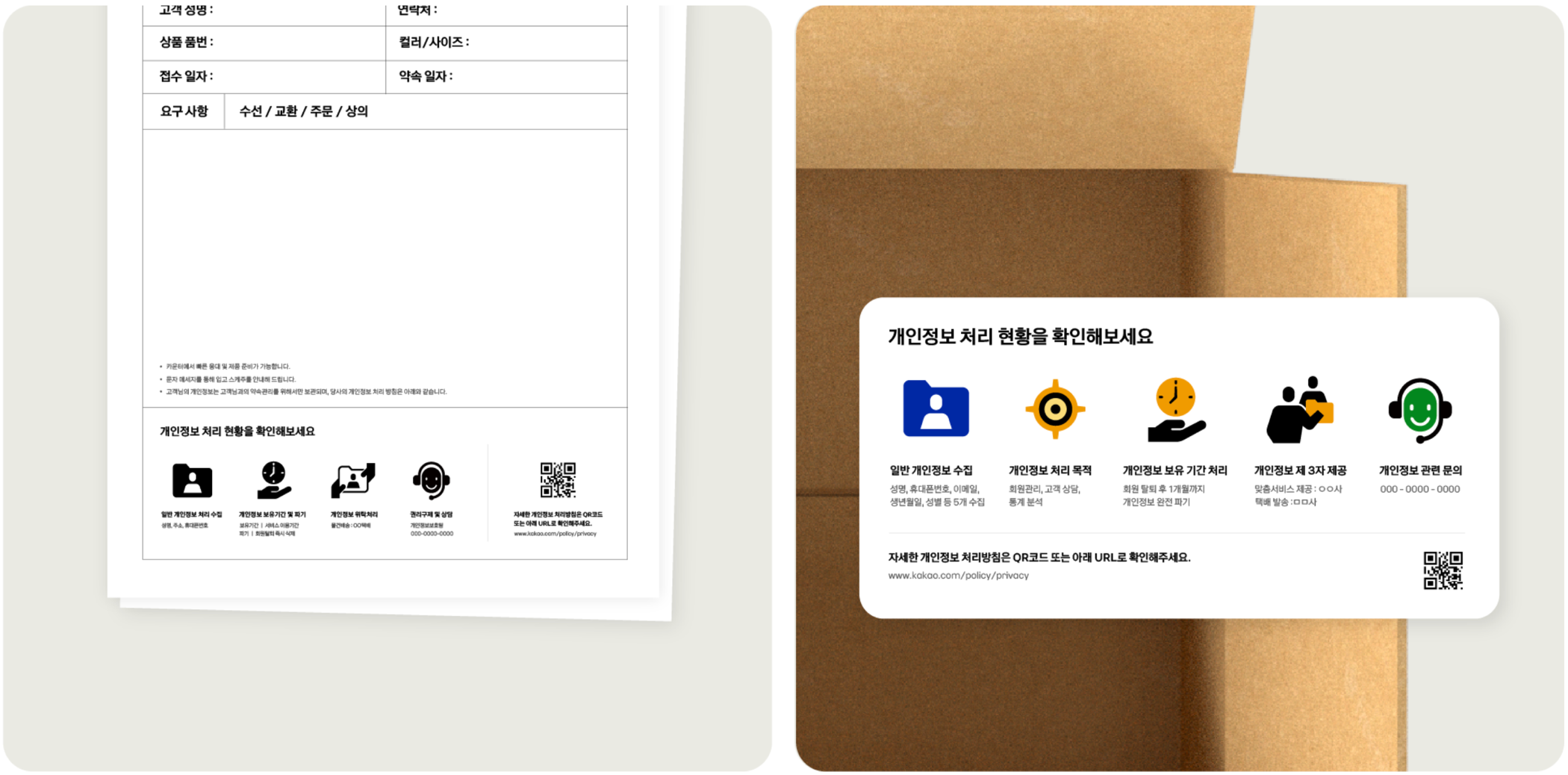
Business owners may download and use a file according to the company’s style based on the business purpose and the environment (online/offline) in which personal information is processed.
The labeling image files are distributed by Kakao for the purpose of helping businesses. Please use them only to increase transparency related to the personal information processing policy or personal information processing in accordance with the purpose of disclosure. In addition, when using the original file, it is recommended that the original image be used without any alteration or damage. All rights, including copyright and ownership, belong to Kakao. Selling original files or modified or altered copies of original files for a fee, and using them for antisocial or illegal purposes are prohibited.
Check labeling design philosophy and storyNew WindowCheck Kakao’s Personal Data Processing PolicyNew Window
2. Privacy protection education
Kakao has created two educational videos containing information on "Precautions for Handling Personal Information of Customers" so that sellers who sell products through online shopping platforms can enhance their sense of responsibility for personal information protection, and freely utilize the videos for personal information protection training for their employees.
Kakao has created two educational videos containing information on "Precautions for Handling Personal Information of Customers" so that sellers who sell products through online shopping platforms can enhance their sense of responsibility for personal information protection, and freely utilize the videos for personal information protection training for their employees.
